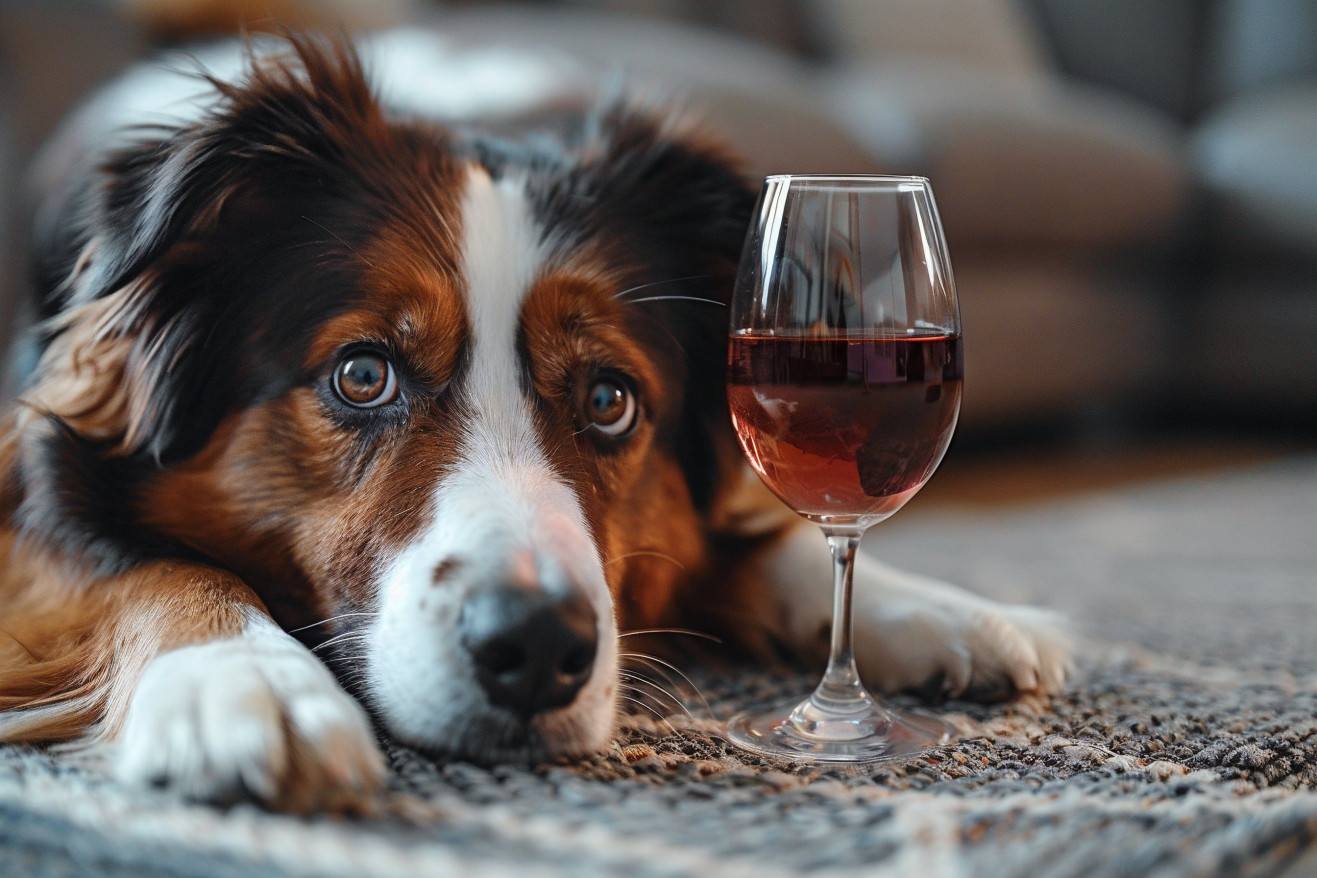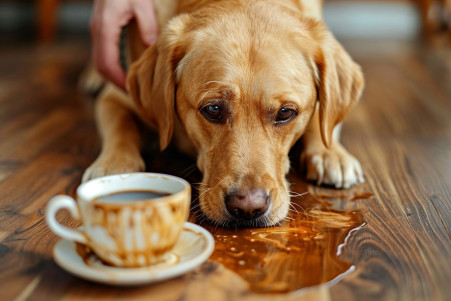Can Dogs Get Drunk? Understanding Alcohol Toxicity in Canines
16 March 2024 • Updated 14 March 2024

We’re all familiar with the effects of alcohol on people, but what happens when our furry friends get ahold of the stuff? While it is true that dogs can get drunk, alcohol is highly toxic to dogs and can lead to alcohol poisoning, even in small amounts.
Symptoms of alcohol poisoning in dogs can be life-threatening and include vomiting, ataxia, and seizures, so it’s important to get your pet to the vet right away if you suspect they’ve ingested alcohol.
This article will review veterinary research and toxicology studies to provide a scientific understanding of how alcohol affects the physiology of dogs. It will also consider the legal and ethical implications of giving alcohol to dogs, including a discussion of animal welfare laws. In addition, it will cover the metabolic reasons why alcohol is poisonous to dogs and the potential long-term effects of alcohol consumption in dogs.
Can dogs get drunk?
Immediate Risks of Alcohol Poisoning in Dogs
If a dog ingests alcohol, it can lead to severe symptoms and the rapid onset of alcohol poisoning, which is a life-threatening condition that requires immediate medical care. Even a small amount of alcohol, whether from alcoholic beverages, alcohol-containing syrups, or raw bread dough, can lead to symptoms in dogs, including vomiting, diarrhea, loss of coordination, depression, excitement, agitation, increased heart rate, panting, and hypersalivation.
More serious symptoms like seizures, coma, and difficulty breathing can also occur. Alcohol is absorbed into a dog’s system quickly after ingestion, which is why these symptoms can develop so rapidly.
Get your dog to the vet as soon as possible if you suspect alcohol poisoning, as it can be fatal and the effects of alcohol poisoning can set in quickly.
Treatment for alcohol poisoning may include decontamination, which can include inducing vomiting or bathing for skin exposures, and supportive care, which can include IV fluids, dextrose to correct hypoglycemia, and antiemetic medications.
To prevent accidental ingestion, make sure to keep alcohol out of your dog’s reach and make sure that guests are aware of the dangers, as well, which is something that Hill’s Pet stresses. By being aware of the immediate risks and acting quickly if you notice any signs of alcohol poisoning, you can make sure that your dogs stay safe and healthy.
Legal and Ethical Implications of Animal Intoxication
In many places, such as the states of California and Maine, it is a crime to intentionally intoxicate animals. For example, California Penal Code Section 597 criminalizes the malicious and intentional maiming, mutilation, torture, wounding, or killing of an animal, which includes intoxication.
Those who break this law can be fined or imprisoned, which demonstrates an increasing intolerance for animal cruelty. Similarly, Maine’s cruelty to animals statute prohibits giving poison or alcohol to animals and specifies the potential jail time and fines for those who do so.
The use of animals in research, teaching, and testing also presents a strong argument against animal intoxication. A study out of the University of Minnesota found that there is a strong consensus in the scientific community about the moral status of animals, which prioritizes their well-being by minimizing pain, stress, and distress.
Internationally, there is a trend toward recognizing the intrinsic value of animals and their right to be free from unnecessary harm, including intoxication. This combination of legal and ethical considerations discourages irresponsible and dangerous behaviors, like exposing dogs to alcohol. It also reflects a broader cultural move toward more humane treatment of animals.
Why Dogs Can’t Have Alcohol
Even though alcohol can be a part of a fun night out for people, for dogs, it can be a completely different and dangerous experience. There are basic metabolic differences between humans and dogs that make alcohol toxic to dogs. According to the Merck Veterinary Manual, dogs metabolize alcohol differently, which can result in metabolic acidosis (a condition where the body produces too much acid), hypothermia, and central nervous system depression.
A study by David Whitmire published on PubMed found that dogs develop a minimal increase in ethanol tolerance over time, with a major change in the absorption of alcohol from the stomach to the intestine. This suggests a metabolic adaptation in dogs that is very different from humans.
Research published on PMC found that chronic ethanol exposure can impair heart metabolism and function in dogs. This shows that there is a risk of harm even if the alcohol isn’t acutely toxic. As a result, dogs can’t metabolize alcohol in the same way that humans can, and it’s up to pet owners to keep these substances out of their dog’s reach.
The potential impact on a dog’s long-term health is great, so it’s important for pet owners to be aware of these differences so they can ensure their pet’s safety and health.
Long-Term Health Effects and Recovery from Alcohol Poisoning
While the short-term treatment of alcohol poisoning in dogs can save their lives, it’s important to think about the long-term effects of these incidents. A study published in PubMed looked at the effects of chronic alcohol consumption on the brains of dogs. It found that dogs’ brains, like humans’, showed signs of ventricular enlargement and cortical thinning, which are signs of long-term damage that may not be reversible.
Further proving that the best way to deal with alcohol poisoning in dogs is to prevent it from happening in the first place.
In terms of recovery, pet owners can expect a period of monitoring and supportive care after the initial treatment of alcohol poisoning. Recovery plans are very successful when implemented quickly by professionals, although the access to specialized care can be limited. Veterinary professionals will work to control any long-term side effects, including things like changes in diet and neurological evaluations, which will be based on the severity of the poisoning.
Knowing these potential side effects of alcohol poisoning in dogs makes it clear that it’s important to be vigilant about keeping alcohol out of the reach of pets. While recovery is possible, the best course of action is to prevent the situation from happening in the first place and educate people to avoid the potential for long-term damage to our furry friends.
Breed and Size: Factors That Impact Alcohol Toxicity in Dogs
Not all dogs are equally at risk for alcohol toxicity, and studies have shown that a dog’s breed and size can impact how it responds to toxic substances like alcohol.
A scientific diagram on ResearchGate by Felix Kundu Shima shows that mixed breeds, German Shepherds, and Rottweilers have much higher rates of intoxication. This suggests that these breeds, which are often used as guard dogs and are known for their protective nature, may be at a higher risk for toxicity.
In addition, it is well known that a dog’s size and metabolism play a big role in how susceptible it is to alcohol toxicity.
Smaller dogs are more likely to experience the effects of alcohol toxicity more quickly than larger dogs due to their smaller body mass.
In addition, puppies and senior dogs are more susceptible to toxicity because their bodies are less able to metabolize and excrete toxins. This means that pet owners need to be especially careful with these dogs and make sure that they keep alcohol and products that contain alcohol in a secure location where their pets can’t access them.
By keeping these factors in mind, pet owners can be aware of the dangers and take steps to protect their pets from the potentially fatal effects of alcohol toxicity.
Raising Awareness: Alcohol Poisoning Prevention for Pets
Raising awareness about alcohol poisoning and how to prevent it is essential for keeping pets safe. The ASPCA Animal Poison Control Center has a number of resources designed to raise awareness about alcohol and other toxic substances that can be harmful to pets.
This includes downloadable guides and infographics that can be used by pet owners and veterinary professionals alike. Ethos Veterinary Health stresses the importance of understanding the risks and taking steps to prevent pet poisoning in order to keep pets safe.
The Pet Poison Helpline is available to help pet owners with information and support when they are dealing with a potential poisoning situation. By taking advantage of these resources and making sure that alcoholic beverages and other products are kept in a secure location, pet owners can help ensure that their pets are safe.
Veterinary professionals and animal welfare organizations also have an important role to play in promoting a culture of prevention by sharing this information through client education and community outreach.
Given the risks associated with alcohol poisoning, it’s important to continue to raise awareness about this issue. In doing so, we can help make sure that pets are safe and protected from accidental exposure to dangerous substances.
Final Thoughts: Protecting Our Pooches
This article has sought to raise awareness about the very serious problem of alcohol toxicity in dogs, and to underscore the danger and potential lethality of dog intoxication.
From the immediate symptoms of poisoning, as outlined by the Pet Poison Helpline, to the legal consequences of animal abuse, we have covered the gamut of alcohol’s impact on dogs.
We have also explored the metabolic differences that have been noted by researchers, including David Whitmire, in PubMed articles, which have explained why dogs are unable to metabolize alcohol like humans and the potentially life-threatening long-term effects that have been shown in veterinary studies.
It is up to us as pet parents to protect our furry loved ones from the dangers of alcohol toxicity. We must be ever-vigilant and dedicated to prevention in order to keep our pets safe and healthy. By using the information and tools provided by the ASPCA Animal Poison Control Center and the Pet Poison Helpline, we can ensure that our pets are safe.
In the end, we must never forget that with the joy and love that our dogs bring into our lives, we also have a responsibility to keep them safe. Education and awareness are the cornerstones of preventing alcohol-related harm and ensuring that our loyal canine companions live long, happy, healthy lives.


